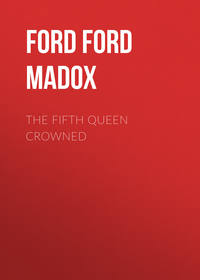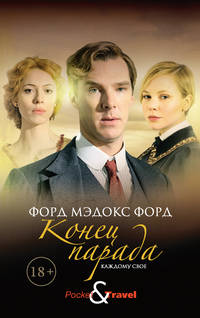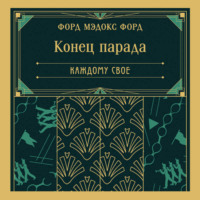 полная версия
полная версияPrivy Seal: His Last Venture
'Oh, magister,' she retorted, with a first touch of scorn in her voice; 'have you, who have had so much truck with women, yet to learn that you may command a woman to be friends with a man, yet no power on earth shall make her love him. Nevertheless, well might Cromwell seek to win her love, and thence these pardons.'
Udal started forward upon his tiptoes.
'I must to London!' he cried. She smiled at him as at a child.
'You are come to be of my advice,' she said.
Udal gazed at her with a wondering patronage.
'Why, what a wench it is,' he said, and he crooked his arm around her ample waist. His face shone with pleasure. 'Angel!' he uttered; 'for Angelos is the Greek for messenger, and signifieth more especially one that bringeth good tidings.' Out of all this holus bolus of envoys, ambassadors, cooks and prisoners one thing appeared plain to view: that, for the first time, a solis ortus cardine, Cromwell had loosened his grip of some that he held. 'And if Crummock looseneth grip, Crummock's power in the land waneth.'
She looked up at him with a coy pleasure.
'Hatest Cromwell then full fell-ly?' she asked.
He put his hands upon her shoulders and solemnly regarded her.
'Woman,' he said; 'this man rideth England with seven thousand spies; these three years I have lived in terror of my life. I have had no bliss that fear hath not entered into – in very truth inter delicias semper aliquid saevi nos strangulavit.' His lugubrious tones grew higher with hatred; he raised one hand above his head and one gripped tight her fat shoulder. 'Terror hath bestridden our realm of England; no man dares to whisper his hate even to the rushes. Me! Me! Me!' he reached a pitch of high-voiced fury. 'Me! Virum doctissimum! Me, the first learned man in Britain, he did force to write a play in the vulgar tongue. Me, a master of Latin, to write in English! I had pardoned him my terror. I had pardoned him the heads of the good men he hath struck off. For that princes should inspire terror is just, and that the great ones of the earth should prey one upon the other is a thing all history giveth precedent for since the days when Sylla hunted to death Marius that sat amidst the ruins of Carthage. But that the learned should be put to shame! that good letters should be cast into the mire! History showeth no ensample of a man so vile since the Emperor Alexander removed his shadow from before the tub of Diogenes.'
'In truth,' she said, blenching a little before his fury, 'I was ever one that loved the rolling sound of your Greek and your Roman.'
'Give me my journey money,' he said, 'let me begone to England. For, if indeed the Lady Katharine hath the King's ear, much may I aid her with my counsels.'
She began to fumble in beneath her apron, and then, as if she suddenly remembered herself, she placed her finger upon her lips.
'Husband,' she said, 'I have for you a gift. How it shall value itself to you I little know, but I have before been much besought and offered high payment for that which now I offer thee. Come.'
The finger still upon her plump lips, she led him to a small door behind the chimney stack. They climbed up through cobwebs, ham, flitches of smoked beef, and darkness, and the reek of wood-smoke, until they came, high up, to a store-room in the slope of a mansard roof. Light filtered dimly between the tiles, and many bales and sacks lay upon the raftered floor like huge monsters in a huge, dim cave.
'Hearken! make no sound,' she whispered, and in the intense gloom they heard a sullen, stertorous, intermittent rumble.
'The envoy sleeps,' she said. She set her eye to a knot-hole in the planked wall. ''A sleeps!' she whispered. 'My pigling made a great thirst in him. Much wine he drank. Set your eye to the knot-hole.'
With his face glued against the rough wood, the magister could see in the large room a great fair man, in a great blue chair behind a littered table. His head hung forward, shewed only a pink bald spot in the thin hair, and brilliant red ears. A slow rumble of snoring came for a long minute, then ceased for as long.
From behind Udal's back came a crash, and he started back to see the large woman, who had overturned a chest.
'That is to test how he sleeps,' she said. 'See if he have moved.' The man, plain to see through the knot-hole, had stirred no muscle; again the heavy rumble of the snore came to them. She spoke quite loudly now. 'Why, naught shall wake him these five hours. 'A hath bolted the door; thus his secretaries shall not come to him. See now.'
She slid back a board in the wall, and Udal could see into what appeared to be a cupboard filled with a litter of papers and of parchments. Udal's heart began to beat so that he noted it there; his eyes searched hers with a glittering excitement – nevertheless a half fear of awakening the envoy kept him from speaking.
'Take them! Take them!' she nudged him with her elbow. 'Six hours ye have to read and to copy.'
'What papers are these?' he muttered, his voice thick betwixt incredulous joy and fear.
'They be the envoy's papers,' she said; 'doubtless these be his letters to the king of this land… What there may be I know not else.'
Udal's hands were in at the hole with the swift clutch of a miser visiting his treasure-chest. The woman surveyed him with pleasure and with pride in her achievement, and with the calmness of routine she fitted a bar across the door of the cupboard where it opened into the envoy's room. Udal was fumbling already with the strings of a packet, his eyes searching the superscription in the gloom.
'Six hours ye have to read and to copy,' she said happily, 'for, for six hours the poppy seed in his wine that he drank shall surely keep him snoring.' And, whilst they went again down the stairway, the papers secreted beneath the magister's gown, she explained with her pride and happiness. The aumbry was so contrived that any envoy or secretary sleeping in her best room must needs put his papers therein, since there was in the room no other chest that locked. And the King of France's chancellors allotted to all envoys her hostelry for a lodging; and once there, she made them heavy with wine and poppy seed after a receipt she had from an Egyptian, and at the appointed time the King of France's men came to read through the papers and to pay her much money and many kisses.
It was six hours later that the magister stood in his own room crushing a fillet of papers into the breast of his brown jerkin. The hostess, walking always calmly as if disorder of the mind were a thing she were a stranger to, had reclimbed the narrow stairway, replaced the papers in the envoy's cupboard and returned to her husband. She sought, mutely, for commendations, and he gave her them.
'Y'have made me the man that holds the secret of England's future,' he said. 'All England that groans beneath Cromwell awaiteth to hear how the cat jumps in Cleves. Now I know how the cat jumps in Cleves.'
She wiped the dust from her hands upon her apron.
'See that ye make good use of the knowledge,' she said. She considered for a moment whilst he ferreted amongst his clothes in the great black press beside the great white bed. 'I have long thought,' she said, 'that greatly might I be of service to a man of laws and of policies. But I have long known that to serve a man is to have little reward unless a woman tie him up in fast bonds – ' He made one of his broad gestures of negation, but she cut in upon his words: 'Aye, so it is. A gossip may serve a man how she will, but once his occasion is past he shall leave her in the ditch for the first fairer face. So I made resolve to make such a man my husband, that his being advanced might advance me. For, for sure this shall not be the last spying service I shall do thee. Many envoys more shall be lodged in this house and many more secrets ye shall learn.'
'Oh beloved Pandora!' he cried; 'opener of all secret places, caskets, aumbries, caves of the winds, thrice blessed Sibyl of the keyhole!' She nodded her head with grave contentment.
'I chose thee for thy resounding speeches,' she said. Her tranquillity and her buxom pleasantness overcame him with sudden affection. He was minded to tell her – because indeed she had made his fortunes for him – that her marriage to him did not hold good since a friar had read the rites.
'I chose thee for thy resounding speeches,' she said, 'and because art so ill-clothed i' the ribs. Give me a thin man of policies to move my bowels of compassion, say I.' For with her secret closets she might make him stand well among the princes, and with her goodly capons set grease upon his ribs, poor soul!
'Oh Guenevere!' he said; 'for was it not the queen of Arthur that made bag-puddings for his starving knights?'
'Aye,' she said; 'great learning you possess.' A little moisture bedewed her blue eyes. 'It grieves me that you must begone. I love to hear thy broad o's and a's!'
'Then by all that is fattest in the land hight Cokaigne I will stay here, thy dutiful goodman,' he said, and tears filled his own eyes.
'Oh nay,' she answered; 'you shall get yourself into the Chancellery, and merry will we feast and devise beneath the gilded roofs.' Her eyes sought the brown beams that ceiled the long room. 'I have heard that chancellors have always gilded roofs.'
Again the tenderness overcame him for the touch of simple pride in her voice. And the confession slipped from his lips:
'Poor befooled soul! Shalt never be a chancellor's dame.'
She was sobbing a little.
'Oh aye,' she said; 'thou shalt yet be chancellor, and I will baste thy cooks' ribs an they baste not thy meat full well.' Such a man as he would find favour with princes for his glosing tongue – aye, and with queens too. At that she covered her face with her apron, and from beneath it her voice came forth:
'If this Kat Howard come to be queen, shall not the old faith be restored?'
The recollection of this particular certainty affected the magister like a stab, for, if the old faith came back, then assuredly marriages by friars should again be acknowledged. He cursed himself beneath his breath: he was loath to leave the woman in the ditch, her trusting face and pleasing ways stirred the strings of his heart. But he was more than loath that the wedding should hold a wedding. He shook his perplexity from him with starting towards the door.
'Time to be gone!' he said, and added, 'Be certain and take care that no Englishman heareth of wedding betwixt thee and me.' It must in England work his sure undoing.
She removed her apron and nodded gravely.
'Aye,' she said, 'that is certain enow with Court ladies, such as they be to-day.' But she asked that when he went among women she should hear nothing of it. For she had had three husbands and several courtiers to prove it upon, that it is better to be lied to than to know truth.
'There is in the world no woman like to thee!' he said with a great sincerity. Once more she nodded.
'Aye, that is the lie that I would hear,' she said. On his part, he started suddenly with pain.
'But thee!' he uttered.
'Aye,' she cried again, 'that too is needed. But be very certain of this, that not easily will I plant upon thy brow that which most husbands wear!' She paused, and once more rubbed her hands. Courteous she must be, since her calling called therefor. But assuredly, having had three husbands, she had had embraces enow to crave little for men. And, if she did that which few good women have a need to – save very piteous women in ballads – she would suffer him to belabour her; – she nodded again – 'And that to a man is a great solace.'
He fled with precipitancy from the thought of this solace, brushing through the narrow passages, stalking across the great guest-chamber and the greater kitchen where, in the falling dusk, the fires glowed red upon the maids' faces and the cooks' aprons, the smoke rose unctuously upward tended with rich smells of meat, and the windjacks clanked in the chimneys. She trotted behind him, weeping in the gloaming.
'If you come to be chancellor in five years,' she whimpered, 'I shall come across the seas to ye. If ye fail, this shall be your plenteous house.'
Whilst she hung round his neck in the shadowy courtyard and he had already one foot in the stirrup, she begged for one more great speech.
'Before Jupiter!' he said, 'I can think of none for crying!'
The big black horse, with its bags before and behind the saddle, stirred, so that, standing upon one foot, he fell away from her. But he swung astride the saddle, his cloak flying, his long legs clasping round the belly. It reared and pawed the twilight mists, but he smote it over one ear with his palm, and it stood trembling.
'This is a fine beast y'have given me,' he said, pleasure thrilling his limbs.
'I have given it a fine rider!' she cried. He wheeled it near her and stooped right down to kiss her face. He was very sure in his saddle, having learned the trick of the stirrup from old Rowfant, that had taught the King.
'Wife,' he said, 'I have bethought me of this: Post equitem sedet– ' He faltered – 'sedet – Behind the rider sitteth– But for the life of me I know not whether it be atra cura or no.'
And, as he left Paris gates behind him and speeded towards the black hills, bending low to face the cold wind of night, for the life of him he knew not whether black care sat behind him or no. Only, as night came down and he sped forward, he knew that he was speeding for England with the great news that the Duke of Cleves was seeking to make his peace with the Emperor and the Pope through the mediancy of the king of that land and, on the soft road, the hoofs of the horse seemed to beat out the rhythm of the words:
'Crummock is down: Cromwell is down. Crummock is down: Cromwell is down.'
He rode all through the night thinking of these things, for, because he carried letters from the English ambassador to the King of England, the gates of no small town could stay his passing through.
IV
Five men talked in the long gallery overlooking the River Thames. It was in the Lord Cromwell's house, upon which the April showers fell like handsful of peas, with a sifting sound, between showers of sunshine that fell themselves like rain, so that at times all the long empty gallery was gilded with light and at times it was all saddened and frosty. They were talking all, and all with earnestness and concern, as all the Court and the city were talking now, of Katharine Howard whom the King loved.
The Archbishop leant against one side of a window, close beside him his spy Lascelles; the Archbishop's face was round but worn, his large eyes bore the trace of sleeplessness, his plump hands were a little tremulous within his lawn sleeves.
'Sir,' he said, 'we must bow to the breeze. In time to come we may stand straight enow.' His eyes seemed to plead with Privy Seal, who paced the gallery in short, pursy strides, his plump hands hidden in the furs behind his back. Lascelles, the Archbishop's spy, nodded his head sagaciously; his yellow hair came from high on his crown and was brushed forward towards his brows. He did not speak, being in such high company, but looking at him, the Archbishop gained confidence from the support of his nod.
'If we needs must go with the Lady Katharine towards Rome,' he pleaded again, 'consider that it is but for a short time.' Cromwell passed him in his pacing and, unsure of having caught his ear, Cranmer addressed himself to Throckmorton and Wriothesley, the two men of forty who stood gravely, side by side, fingering their long beards. 'For sure,' Cranmer appealed to the three silent men, 'what we must avoid is crossing the King's Highness. For his Highness, crossed, hath a swift and sudden habit of action.' Wriothesley nodded, and: 'Very sudden,' Lascelles allowed himself utterance, in a low voice. Throckmorton's eyes alone danced and span; he neither nodded nor spoke, and, because he was thought to have a great say in the councils of Privy Seal, it was to him that Cranmer once more addressed himself urgently:
'Full-bodied men who are come upon failing years are very prone to women. 'Tis a condition of the body, a humour, a malady that passeth. But, while it lasteth, it must be bowed to.'
Cromwell, with his deaf face, passed once more before them. He addressed himself in brief, sharp tones to Wriothesley:
'You say, in Paris an envoy from Cleves was come a week agone?' and passed on.
'It must be bowed to,' Cranmer continued his speech. 'I do maintain it. There is no way but to divorce the Queen.' Again Lascelles nodded; it was Wriothesley this time who spoke.
'It is a lamentable thing!' and there was a heavy sincerity in his utterance, his pose, with his foot weightily upon the ground, being that of an honest man. 'But I do think you have the right of it. We, and the new faith with us, are between Scylla and Charybdis. For certain, our two paths do lie between divorcing the Queen and seeing you, great lords, who so well defend us, cast down.'
Coming up behind him, Cromwell placed a hand upon his shoulder.
'Goodly knight,' he said, 'let us hear thy thoughts. His Grace's of Canterbury we do know very well. He is for keeping a whole skin!'
Cranmer threw up his hands, and Lascelles looked at the ground. Throckmorton's eyes were filled with admiration of this master of his that he was betraying now. He muttered in his long, golden beard.
'Pity we must have thy head.'
Wriothesley cleared his throat, and having considered, spoke earnestly.
'It is before all things expedient and necessary,' he said, 'that we do keep you, my Lord Privy Seal, and you, my Lord of Canterbury, at the head of the State.' That was above all necessary. For assuredly this land, though these two had brought it to a great pitch of wealth, clean living, true faith and prosperity, this land needed my Lord Privy Seal before all men to shield it from the treason of the old faith. There were many lands now, bringing wealth and commodity to the republic, that should soon again revert towards and pay all their fruits to Rome; there were many cleaned and whitened churches that should again hear the old nasty songs and again be tricked with gewgaws of the idolaters. Therefore, before all things, my Lord Privy Seal must retain the love of the King's Highness – Cromwell, who had resumed his pacing, stayed for a moment to listen.
'Wherefore brought ye not news of why Cleves' envoy came to Paris town?' he said pleasantly. 'All the door turneth upon that hinge.'
Wriothesley stuttered and reddened.
'What gold could purchase, I purchased of news,' he said. 'But this envoy would not speak; his knaves took my gold and had no news. The King of France's men – '
'Oh aye,' Cromwell continued; 'speak on about the other matter.'
Wriothesley turned his slow mind from his vexation in Paris, whence he had come a special journey to report of the envoy from Cleves. He spoke again swiftly, turning right round to Cromwell.
'Sir,' he said, 'study above all to please the King. For unless you guide us we are lost indeed.'
Cromwell worked his lips one upon another and moved a hand.
'Aye,' Wriothesley continued; 'it can be done only by bringing the King's Highness and the Lady Katharine to a marriage.'
'Only by that?' Cromwell asked enigmatically.
Throckmorton spoke at last:
'Your lordship jests,' he said; 'since the King is not a man, but a high and beneficent prince with a noble stomach.'
Cromwell tapped him upon the cheek.
'That you do see through a millstone I know,' he said. 'But I was minded to hear how these men do think. You and I do think alike.'
'Aye, my lord,' Throckmorton answered boldly. 'But in ten minutes I must be with the Lady Katharine, and I am minded to hear the upshot of this conference.'
Cromwell laughed at him sunnily:
'Go and do your message with the lady. An you hasten, you may return ere ever this conference ends, since slow wits like ours need a store of words to speak their minds with.'
Lascelles, the silent spy of the archbishop, devoured with envious eyes Throckmorton's great back and golden beard. For his life he dared not speak three words unbidden in this company. But Throckmorton being gone the discussion renewed itself, Wriothesley speaking again.
He voiced always the same ideas, for the same motives: Cromwell must maintain his place at the cost of all things, for the sake of all these men who leaned upon him. And it was certain that the King loved this lady. If he had sent her few gifts and given her no titles nor farms, it was because – either of nature or to enhance the King's appetite – she shewed a prudish disposition. But day by day and week in week out the King went with his little son in his times of ease to the rooms of the Lady Mary. And there he went, assuredly, not to see the glum face of the daughter that hated him, but to converse in Latin with his daughter's waiting-maid of honour. All the Court knew this. Who there had not seen how the King smiled when he came new from the Lady Mary's rooms? He was heavy enow at all other times. This fair woman that hated alike the new faith and all its ways had utterly bewitched and enslaved the King's eyes, ears and understanding. If the King would have Katharine Howard his wife the King must have her. Anne of Cleves must be sent back to Germany; Cromwell must sue for peace with the Howard wench; a way must be found to bribe her till the King tired of her; then Katharine must go in her turn, once more Cromwell would have his own, and the Protestants be reinstated. Cromwell retained his silence; at the last he uttered his unfailing words with which he closed all these discussions:
'Well, it is a great matter.'
The gusts of rain and showers of sun pursued each other down the river; the lights and shadows succeeded upon the cloaked and capped shapes of the men who huddled their figures together in the tall window. At last the Archbishop lost his patience and cried out:
'What will you do? What will you do?'
Cromwell swung his figure round before him.
'I will discover what Cleves will do in this matter,' he said. 'All dependeth therefrom.'
'Nay; make a peace with Rome,' Cranmer uttered suddenly. 'I am weary of these strivings.'
But Wriothesley clenched his fist.
'Before ye shall do that I will die, and twenty thousand others!'
Cranmer quailed.
'Sir,' he temporised. 'We will give back to the Bishop of Rome nothing that we have taken of property. But the Bishop of Rome may have Peter's Pence and the deciding of doctrines.'
'Canterbury,' Wriothesley said, 'I had rather Antichrist had his old goods and gear in this realm than the handling of our faith.'
Cromwell drew in the air through his nostrils, and still smiled.
'Be sure the Bishop of Rome shall have no more gear and no more guidance of this realm than his Highness and I need give,' he said. 'No stranger shall have any say in the councils of this realm.' He smiled noiselessly again. 'Still and still, all turneth upon Cleves.'
For the first time Lascelles spoke:
'All turneth upon Cleves,' he said.
Cromwell surveyed him, narrowing his eyes.
'Speak you now of your wisdom,' he uttered with neither friendliness nor contempt. Lascelles caressed his shaven chin and spoke:
'The King's Highness I have observed to be a man for women – a man who will give all his goods and all his gear to a woman. Assuredly he will not take this woman to his leman; his princely stomach revolteth against an easy won mastership. He will pay dear, he will pay his crown to win her. Yet the King would not give his policies. Neither would he retrace his steps for a woman's sake unless Fate too cried out that he must.'
Cromwell nodded his head. It pleased him that this young man set a virtue sufficiently high upon his prince.
'Sirs,' he said, 'daily have I seen this King in ten years, and I do tell ye no man knoweth how the King loves kingcraft as I know.' He nodded again to Lascelles, whose small stature seemed to gain bulk, whose thin voice seemed to gain volume from this approval and from his 'Speak on. About Cleves.'
'Sirs,' Lascelles spoke again, 'whiles there remains the shade of a chance that Cleves' Duke shall lead the princes of Germany against the Emperor and France, assuredly the King shall stay his longing for the Lady Katharine. He shall stay firm in his marriage with the Queen.' Again Cromwell nodded. 'Till then it booteth little to move towards a divorce; but if that day should come, then our Lord Privy Seal must bethink himself. That is in our lord's mind.'









